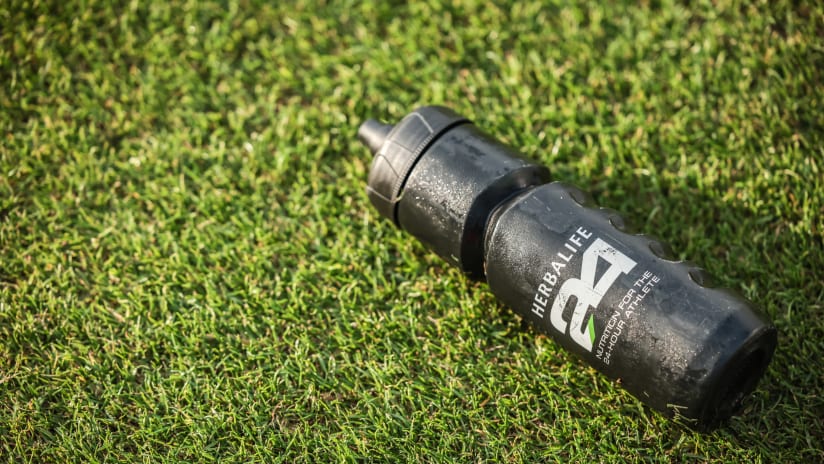Herbalife is the sports nutrition and presenting partner for the LA Galaxy. Herbalife Dietitians work closely with the LA Galaxy technical staff to make sure we are maximizing their nutrition to support performance goals.
Fat1-3
Fat also plays a critical role in sports performance, as it provides a dense energy source, aids in the absorption of fat-soluble vitamins (A, D, E, and K), is needed for hormone production and immune function and can help to reduce inflammation (e.g. omega-3s).
It is important to consume some beneficial fats at each meal to help the body absorb certain nutrients. However, for meals/snacks close to training or matches, it is important to avoid high fat intake as this can cause digestive discomfort during activity.
Some beneficial fat options to incorporate into your meal plan could include:
- Avocado
- Nuts and seeds
- Olive oil
- Nut butter
- Dairy
- Soymilk, edamame, tofu
- Salmon and other fatty fish
Omega-3 fatty acids must also be highlighted here, as athletes often have higher needs (~2-4g per day is often supplemented) than the typical person. Omega-3s are critical for reducing inflammation, modulating muscle recovery, promoting blood flow, improving endurance, and promoting overall brain health and cognition.
Foods high in omega-3s include:
- Fatty fish
- Shellfish
- Seaweed
- Flaxseed
- Chia seeds
- Hempseed
- Edamame
- Eggs
- Fortified dairy products
For those who do not consume enough omega-3s on a daily basis, supplementation may be beneficial. As always, discuss supplementation with a Registered Dietitian to ensure this is the right option for you.
Micronutrients1
A balanced, whole foods-focused diet is key for obtaining all of the micronutrients essential for performance. The micronutrient deficiency section in Part 3 of this blog series outlines multiple lists of foods that are good options for increasing the intake of the most commonly deficient nutrients in athletes. However, some women may consider micronutrient supplementation to help fill nutritional gaps.
We recommend that all supplements for athletes be NSF-Certified for SportÒ* (to ensure they are clean of banned substances) and dosed to the athlete’s specific individualized needs (backed by lab data) by a Sports Performance Dietitian.
Hydration1
The importance of hydration cannot be understated. Hydration is composed of a balance of both fluids and electrolytes and is important for joint lubrication, transportation of nutrients, oxygen, waste within the blood, muscle function, and thermoregulation.
Underhydration can lead to headaches, dizziness, fatigue, moodiness, inability to focus, poor appetite, nausea, decreased endurance, decreased reaction time, increased perception of exertion, intolerance to heat, impaired recovery, and increased risk of muscle tears and strains.
Prior to and during training and games, it is important to drink water or sports drinks to maintain adequate levels of hydration. Physical activity leads to losses of both water and electrolytes through sweat. These losses must be replenished to keep the body in top shape to perform during training and matches. Weighing yourself before and after training can help you to determine how much water to replenish with.
Hydration tips:
- Before training: consume 1 water bottle 2-3 hrs before, consume ½ water bottle 15 minutes before
- During training: consume 1 water bottle/sports drink per hour
- After training: for every lb of bodyweight lost, drink 1 water bottle/sports drink
Elite athletes undergo frequent testing to ensure they are adequately hydrated. Paying attention to urine color (aim for pale yellow like lemonade!) can also help you to self-evaluate your hydration status.
Conclusion
Female athletes have special nutrition considerations in order to maintain their wellness, optimize athletic performance, and prevent injuries. Focusing on achieving adequate or optimal consumption of energy, carbohydrates, protein, fat, micronutrients, and hydration is crucial for any athlete’s success in their game, along with for their health off the field.
For more specific and individualized recommendations, it is critical to work directly with a Sports Dietitian.
*Certified for SportÒ is a registered trademark of NSF International.
References
1. Thomas DT, Erdman KA, Burke LM. Position of the academy of nutrition and dietetics, dietitians of Canada, and the American college of sports medicine: Nutrition and athletic performance. J Acad Nutr Diet. 2016;116(3):501-528. doi:10.1016/j.jand.2015.12.006
2. Ritz P, Rockwell M. Promoting optimal omega-3 fatty acid status in athletes. Gatorade Sports Science Institute. 202. SSE212.
3. Omega-3 Fatty Acids and Performance. Collegiate and Professional Sports Dietitians Association. Accessed August 8, 2023. https://www.sportsrd.org/wp-content/uploads/2020/05/omega-3_Infographic.pdf.




